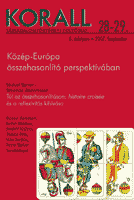A háborús bűnök megtorlása a második világháború utáni Romániában és Magyarországon
Retorsion of the war-crimes after World War II in Romania and Hungary
Author(s): Petru WeberSubject(s): History
Published by: KORALL Társadalomtörténeti Egyesület
Summary/Abstract: Retorsion of the war-crimes after World War II in Romania and Hungary. A comparison There is insuffi cient information at our disposal about the prosecution of war criminals in the postwar history of the former socialist countries, since the communist regime put the subject into shade, or in accordance with the party line misinterpreted that. The author has examined in his essay the attributes of Romanian and Hungarian jurisdiction in the multi-party period, and furthermore the infl uence of the establishment of totalitarian communist regime on the prosecution of war criminals. In the article the author attempted to explain the fact that in Hungary far more war criminals were condemned to death than in Romania. The results so far show that with the instituted proceedings against the war criminals both countries sent messages to their own inhabitants and to the decision-makers of the Parisian peace conference as well. Till February 1947 Romania strived for the recognition as a participant state of the war against Hitler, while Hungary lived in the hope of at least partially upholding of the territories which were regained between 1938 and 1941, and trusted milder terms of the peace treaty. The participation of Romania in the war against the Nazi Germany infl uenced considerably the Romanian national identity, in so far as they regarded themselves as winner and they awaited such recognition from the Parisian peace conference as well. As it had occurred only partially, it was followed by the indignation of the Romanian society. This can explain the strategy that till February 1947 the treatment of the war criminals was essentially milder here than in Hungary. Romania wanted to demonstrate that the Romanian army committed far less war crimes than it would have been assumed by the winners about the former ally of Nazis. Hungary, however, can be regarded only as the loser of the Second World War, for this reason Hungary attempted to demonstrate “outwards” that there the greatest number war criminals possible would be punished. With that rigour the Hungarian jurisdiction tried to clear the “guilty” Hungary by the winner great powers.
Journal: Korall - Társadalomtörténeti folyóirat
- Issue Year: 2007
- Issue No: 28-29
- Page Range: 134-145
- Page Count: 12
- Language: Hungarian

